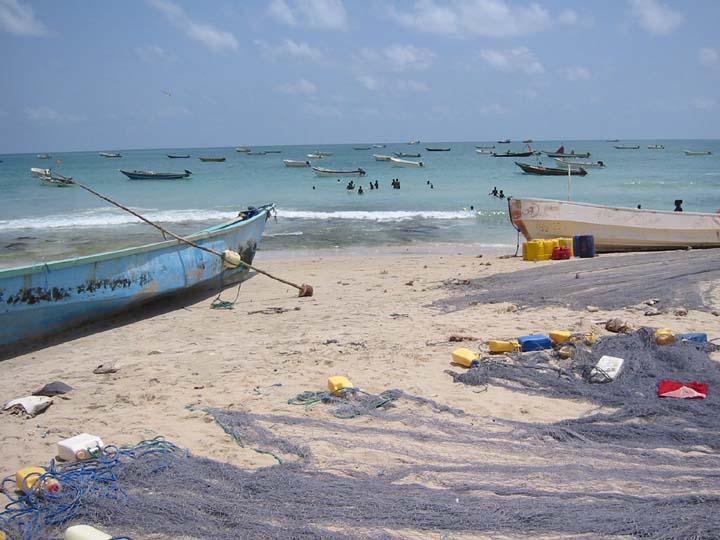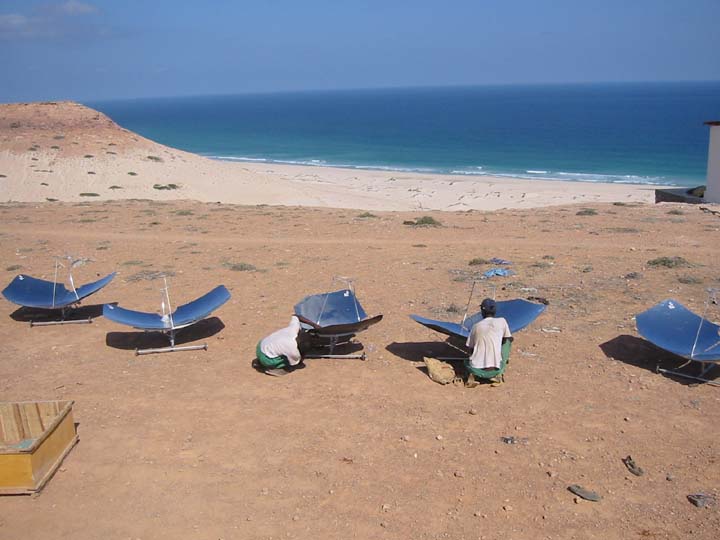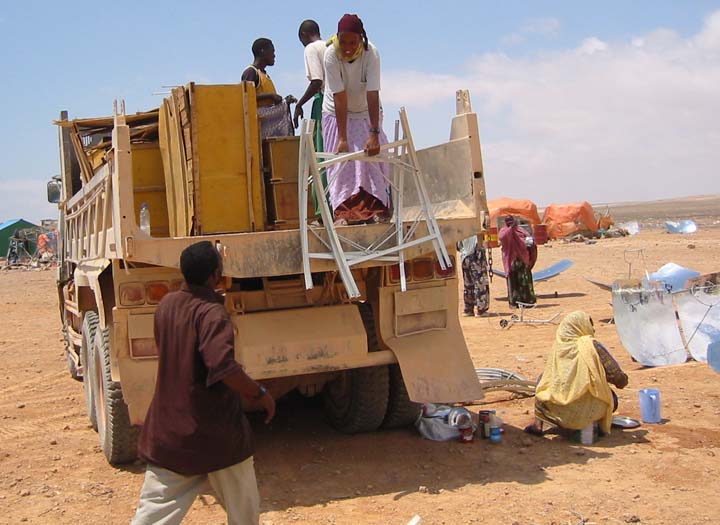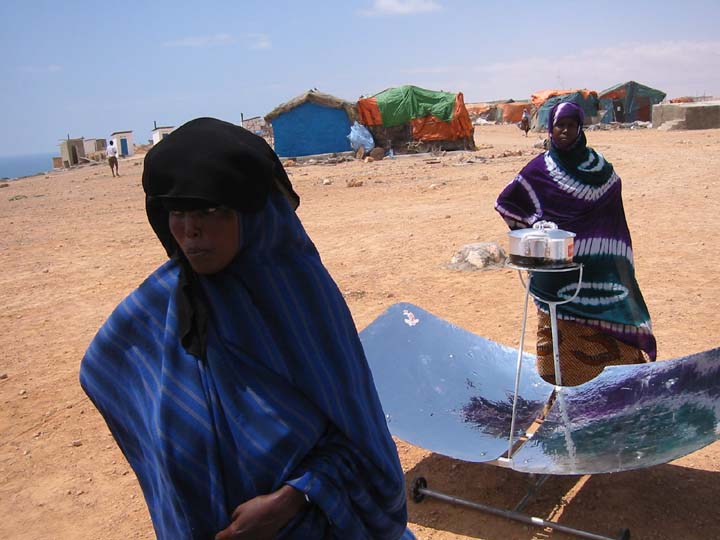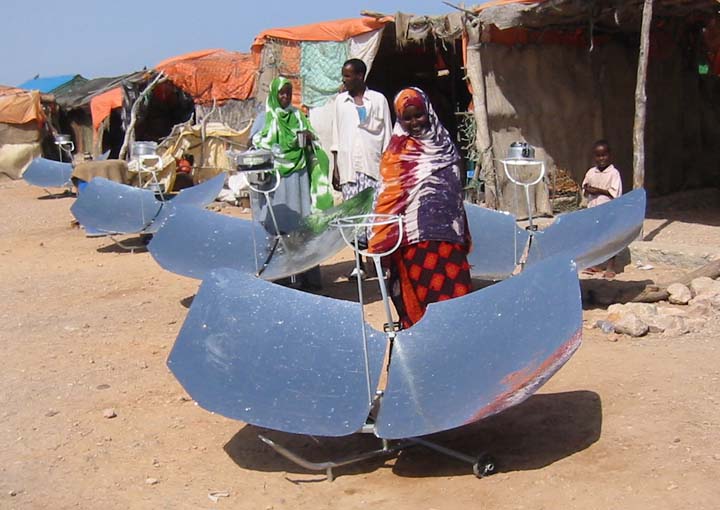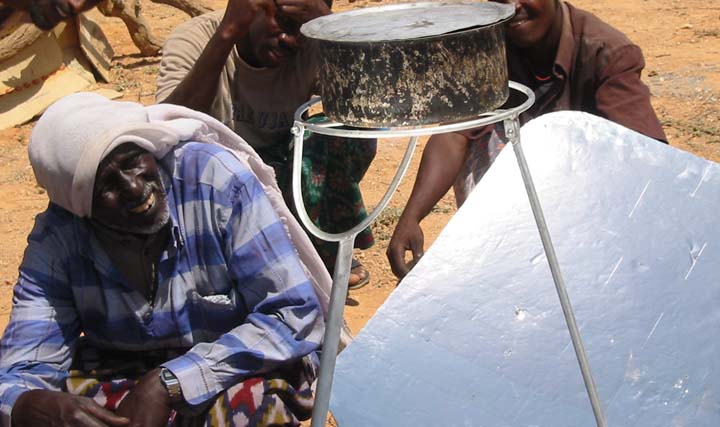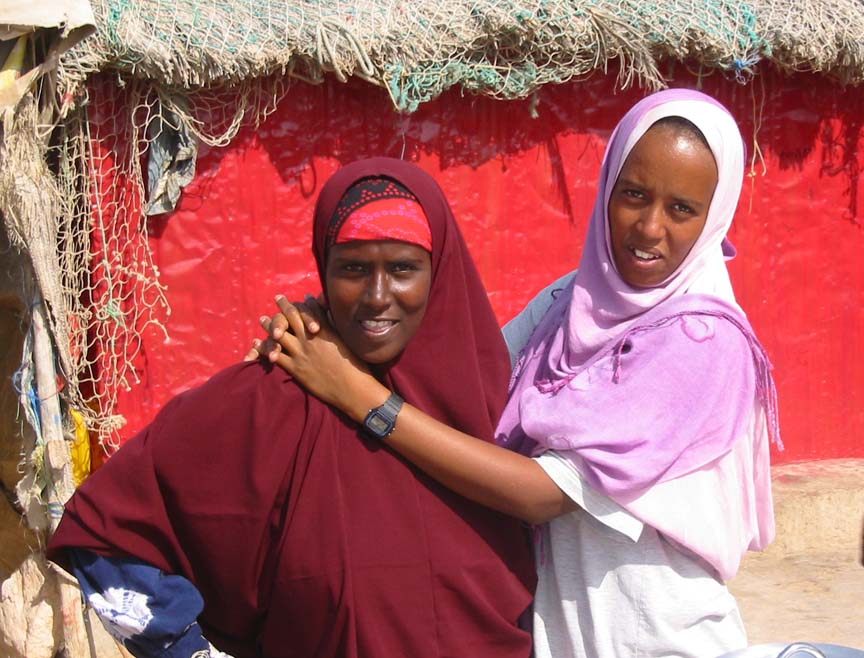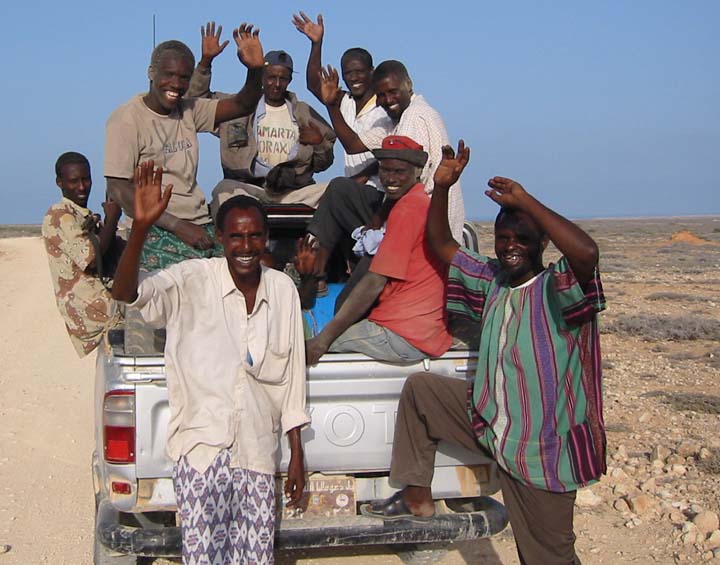bender bayla, the world's first solar cooker village
go to the home page of sun fire cooking
solar cookers are vital for somalia's pastoral future. this is why sun fire cooking's pioneering work in bender bayla is so important.
a recent(*) united nations reports on somalia by the food security assessment unit (fsau) as well as well as reports by unicef and unocha, makes it very clear that what 2002 goldman environmental prize winner fatima jibrell has been saying for over 10 years is coming to pass� deforestation and the possible end of somali pastoral way of life caused mainly by the charcoal trade!!! not by drought or civil war although they are contributing factors. the charcoal trade is the root cause.
it is urgent that the charcoal be stopped, that reforestation, erosion prevention be initiated on a wide scale. solar cookers must be a key component to this strategy. solar cookers must be distributed everywhere. in somalia there is no other practical cost effective alternative. this work is more urgent than ever given the ongoing humanitarian crisis, much of which is caused directly and indirectly by the charcoal trade. sun fire cooking is offering an alternative to charcoal. of course, most important is to stop the trade and undertake reforestation and more erosion control. however, most somalis and in fact all of east africa needs to switch to solar cooking urgently.
here are some quotes from the fsau report.
crisis as opportunity: reversing the trend of massive and nearly irreversible degradation of rangelands through deforestation for charcoal production� executive summary p. 2
so while charcoal cartels profit handsomely - the somali people are left with a desertified landscape - one with minimal economic potential and a tragic contrast to the proud pastoral cultural identity of somali people. with every crisis there is an opportunity. the current humanitarian emergency in the southern regions is also an opportunity to highlight the charcoal tragedy there. the somali charcoal tragedy is not a peripheral environmental issue, but is undermining the foundations of somali economic development and, sadly, over time it promises to undermine the very core of somali cultural identity. p. 27
(*) fsau technical series report no iv.8 february 22, 2006
horn relief has now completed the distribution of a solar cooker to each of the some 550 households in the fishing village of bender bayla.
bender bayla is near the northern tip of somalia and was badly damaged by the 2004 tsunami.
the local fishermen catch lobster and shark. the lobster tails and sharks fin are exported. the rest of the shark is not eaten. the local people get very little benefit from these high value products. bender bayla and other coastal villages are very poor.assembly and distribution of the cookers was a more difficult undertaking than initially anticipated. an additional complication was the late arrival of the second shipment of cookers from china because of shipping delays. in the end the team leader shukria dini led a team of 12 persons team, known affectionately as the solar squad, who have the assembly, distribution and training routine running smoothly.
.
houses near the beach were destroyed by the tsunami. some houses have been rebuilt. solar cookers are in use among the rubble.we have noted that in some parts of town the cookers are in constant use while other areas they mostly sit idle. this can be attributed to some people 'catch on' quickly and help their neighbours. we expect participation rates to increase as the solar squad returns to help people get started using the solar cookers.
.
this woman says she has helped her neighbours to use their solar cookers. she says she now uses very little charcoal.we are also distributing the cookers to three other coastal villages about 2 hours drive south of bender bayla. we visited two of these villages, dhuur and el-didhir 10-15 march 2005. these villages are much smaller than bender bayla.
the fishing village of el-didhir is one thousand feet above the ocean at the edge of a steep escarpment. fishermen have a long walk to their boats.
both women and men help unload the truck and assemble the cookers. the team has now got assembly down to a fine rhythm. seventy-five cookers were unloaded, assembled and distributed in one day.
|
team leader shukria dini looks on as a woman signs for her family's cookers.
a woman has just taken possession of her solar cooker.
el-didhir village is particularly taken with the solar cookers. they do not seem to be intimidated by the new technology and are keen to learn and to start cooking.
in dhuur village an old man want to learn how to use the cookers. when we visited him about noon he said "this cooker is no good. i have had this pot on the stove since 8 o'clock this morning and the water is still not hot." we explain that there are a few simple things he must do first. he asks why do i need to turn the mirror? a solar squad member patiently explains in simple terms the principles of a concave mirror. a person who grew up in the west probably played as a child with a mother's make-up mirror, or played with a magnifying glass using the sun to burn a hole in a piece of paper and at school learned the basic principles of physics. most of the pastoral and fishing people in this region of somalia have not had the opportunity to receive an education. it is for this reason that so much time must be taken to teach people how to use a solar cooker.
two members of the solar squad pose for the camera in front of a brightly pained house made of flattened oil drums in el-didhir village. the roof is held in place by old fishing nets.
it's a dusty two hour drive from bender bayla to el-didhir, but even after a long day the solar squad is in good spirits.
